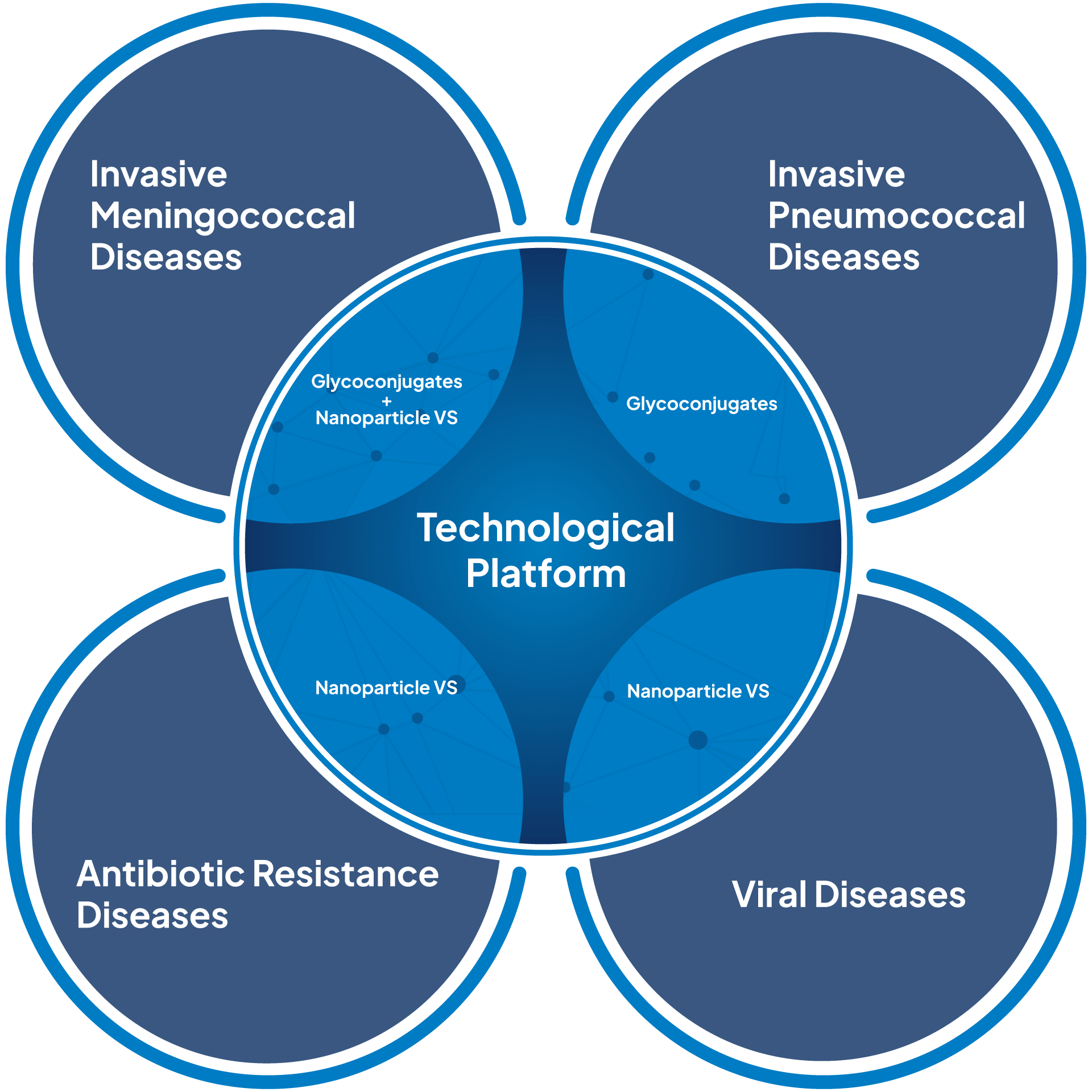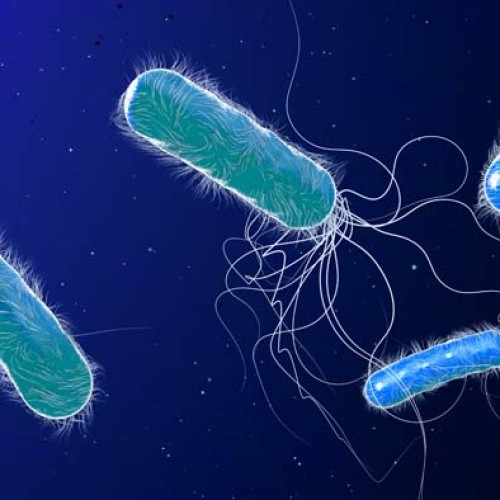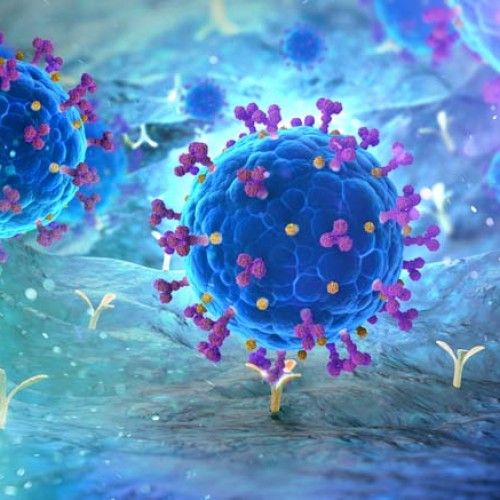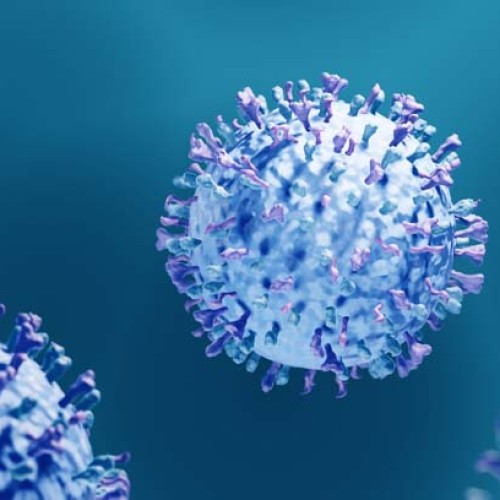The multifunctionality of BiosYnth's Technological Platforms in response to epidemiological variations

Glycoconjugate Vaccine Platform
Use of CRM197 Protein and Tetanus Toxoid (TT) as T-cell dependent helper vectors
Nanostructured Vector System Platform for Bacterial and Viral Antigens
Characterized by an immediate activity of enhancing T Helper cells for the conformational epitopes of key antigens
How do vaccines work

Invasive diseases
A multidimensional battlefield
-
 & BiosYnth Expertise.jpg)
Hemophilus Influenzae Type b (Hib)
Explore more -
Hemophilus Influenzae Type b (Hib) is a severe bacterium causing life-threatening diseases such as meningitis and pneumonia, mainly in children.
At BiosYnth Research Laboratories, we hold specialized know-how to combat this menacing pathogen. Armed with advanced technologies and profound expertise, we are at the forefront of developing innovative strategies to tackle Hib effectively, turning our profound knowledge into powerful solutions against this formidable disease. BiosYnth stands as a beacon of hope in the ongoing battle against Hib, promising a future with robust defense mechanisms against this ruthless bacterium.
-

Invasive Meningococcal Disease ACWY e Group B
Explore more -
Meningitis is a severe infectious disease that continues to pose a significant global health challenge. Caused by a bacterial infection, it brutally attacks the human body, primarily manifesting as inflammation of the membranes surrounding the brain and spinal cord.
BiosYnth Research Laboratories is actively engaged in this battle, bringing a wealth of specialized knowledge and a suite of innovative patents. Our laboratory focuses on developing advanced solutions, using cutting-edge technological approaches to combat meningitis.
BiosYnth’s expertise is not merely theoretical; the laboratory has crafted practical solutions, advancing research and innovation, to contribute effectively to the fight against this devastating disease. BiosYnth thus stands as a leader in the realm of research and the development of therapeutic strategies against meningitis
-

Invasive Pneumococcal Disease
Explore more -
Pneumococcal disease is caused by the bacterium Streptococcus pneumoniae. This disease, which can manifest as pneumonia, meningitis, or sepsis, primarily affects the most vulnerable groups such as children and the elderly, causing high rates of morbidity and mortality.
BiosYnth Research Laboratories, with over 30 years of research and development, has managed to create a technology that allows the development of a pneumococcal vaccine capable of including up to 20 different antigens. This innovative and cutting-edge approach positions us as leaders in the field, enabling us to offer tangible and advanced solutions for the prevention of pneumococcal diseases.
Thanks to our technology, we can customize vaccines by including a wide spectrum of antigens as needed, reaching up to a 20-valent vaccine. This means that we can create more effective and targeted vaccines that better meet the needs of the population and offer broader protection against various forms of pneumococcal disease.
-

Neisseria gonorrhoeae
Explore more -
Neisseria gonorrhoeae is a Gram-negative bacterium responsible for gonorrhea, one of the most common sexually transmitted infections (STIs) worldwide. Gonorrhea can cause a range of symptoms, including urethritis, cervicitis, proctitis, and in some cases, can progress to more serious complications such as pelvic inflammatory disease in women or epididymitis in men.
The World Health Organization has reported increasing resistance of N. gonorrhoeae to antibiotics, making prevention and treatment increasingly challenging. In this context, the need for new therapeutic and preventive solutions has become increasingly urgent.
BiosYnth Research Laboratories, through its advanced technological platform, is working to develop a prototype vaccine against gonorrhea. This effort represents a fundamental step towards the elimination of this disease and underscores the importance of technological solutions in combating infectious diseases.
-
Clostridium Difficile (Colon Cancer)
Explore more -
Clostridium difficile, commonly known as C. difficile or C. diff, is a bacterium that can cause severe infections, ranging from mild diarrhea to pseudomembranous colitis, a potentially life-threatening condition. These infections are particularly common in hospital settings and other healthcare facilities, where frequent use of antibiotics can alter the intestinal flora and promote the proliferation of C. difficile. Additionally, prolonged and repeated infections with C. difficile may pose a risk factor for the development of colon cancer.
Faced with this growing threat, the traditional therapeutic approach based on antibiotics often proves inadequate, making the use of innovative solutions imperative.
BiosYnth Research Laboratories, through its patented innovative Technological Platform, is currently engaged in the development of a prototype vaccine specifically designed to combat C. difficile infections and potentially reduce the associated risk of colon cancer.
-

Enteropathogenic bacteria
Explore more -
Enteropathogenic bacteria (EPEC) are a group of bacteria known for causing gastrointestinal disturbances in humans, particularly diarrhea. These bacteria are especially problematic in developing countries and can have devastating effects, especially on children. EPEC infections are often associated with sources of contaminated water and food and can quickly turn into epidemics if not adequately controlled. Faced with this threat, the traditional therapeutic approach often falls short as antibiotic resistance becomes increasingly prevalent.
BiosYnth Research Laboratories, through its patented advanced technological platform, is working to develop a prototype vaccine against infections caused by enteropathogenic bacteria.
-

Escherichia coli
Explore more -
Escherichia coli, commonly known as E. coli, is a bacterium naturally found in the intestines of many people and animals. Although many strains of E. coli are harmless, some can cause infections ranging from mild to severe. Localized infections can manifest as gastroenteritis, while systemic infections can affect various organs and systems in the body, leading to conditions such as sepsis.
In particular, some strains of E. coli can cause urinary tract infections, pneumonia, neonatal meningitis, and other systemic infections. The widespread and sometimes inappropriate use of antibiotics has led to resistance in some E. coli variants, making the treatment of these infections more challenging.
BiosYnth Research Laboratories, through its patented advanced technological platform, is working to develop a prototype vaccine against E. coli infections.
-
.jpg)
S. typhi/Paratyphi (enteric infections)
Explore more -
Salmonella typhi and Salmonella paratyphi are bacteria responsible for typhoid fever and paratyphoid fever, respectively. These enteric infections are primarily transmitted through the consumption of contaminated water or food. Once ingested, these bacteria can colonize the intestines and cause a range of symptoms, including high fever, malaise, and abdominal pain.
Infections caused by S. typhi and S. paratyphi represent a serious public health concern, especially in regions where access to clean water and adequate sanitation systems is limited. If left untreated, these infections can become severe and lead to potentially fatal complications. In a world where antibiotic resistance is increasing, the battle against typhoid and paratyphoid fever is becoming increasingly complex.
BiosYnth Research Laboratories, through its patented advanced technological platform, is working to develop a prototype vaccine against infections caused by S. typhi and Paratyphi.
-

Pseudomonas aeruginosa
Explore more -
Pseudomonas aeruginosa is an opportunistic bacterium that can cause respiratory infections, particularly in individuals with compromised immune functions or chronic lung diseases such as cystic fibrosis. These infections can range from mild to severe pneumonia, often resistant to conventional antibiotic treatments due to the bacterium's significant ability to develop resistance. Infections from P. aeruginosa are particularly concerning in hospital settings, where they can cause severe nosocomial infections, especially in intensive care units. The ability of this bacterium to form biofilms makes it particularly resistant to both antibiotics and the actions of the immune system.
In a clinical context where antibiotic resistance is becoming increasingly widespread, it is crucial to find alternative and innovative solutions to combat this pathogen.
BiosYnth Research Laboratories, through its advanced patented technological platform, is working to develop a prototype vaccine against Pseudomonas aeruginosa infections.
-

Klebsiella pneumoniae
Explore more -
Klebsiella pneumoniae is a gram-negative bacterium that can cause severe respiratory infections, such as pneumonia, especially in hospitalized patients or those with weakened immune systems. While it is normal to find it in the environment and in the human intestine without causing any problems, under certain conditions it can become pathogenic, leading to infections outside the respiratory system, such as urinary tract or blood infections.
One of the main problems associated with K. pneumoniae is its growing resistance to antibiotics, making infections from this bacterium increasingly difficult to treat. This resistance is particularly concerning in hospital settings, where nosocomial infections from resistant strains can lead to severe and, in some cases, fatal complications. In an era where antimicrobial resistance is one of the major challenges to global health, having new tools to effectively combat these pathogens is essential.
BiosYnth Research Laboratories, through its advanced patented technological platform, is working to develop a prototype vaccine against Klebsiella pneumoniae infections.
-
 & BiosYnth Expertise.jpg)
Influenza
Explore more -
Influenza, commonly known as the "flu," is caused by influenza viruses that infect the respiratory system. This disease can range from mild to severe forms and is responsible for seasonal epidemics affecting millions of people every year, leading to hospitalizations and, in some cases, deaths. Common symptoms include fever, cough, sore throat, muscle aches, fatigue, and nasal congestion.
People of all ages can contract the flu, but certain groups, such as the elderly, young children, pregnant women, and people with pre-existing medical conditions, are at a higher risk of severe complications. Transmission mainly occurs through respiratory droplets, making influenza highly contagious, especially in enclosed spaces like schools, offices, and public transport.
Each year, the composition of influenza strains changes, necessitating the formulation of new vaccines. In this constantly evolving scenario, BiosYnth Research, through its advanced patented technological platform, is working to develop a prototype of a new vaccine against influenza.
-

Acinetobacter baumannii
Explore more -
Acinetobacter baumannii is a gram-negative bacterium that has gained notoriety as a hospital pathogen, particularly for its ability to cause severe respiratory infections such as pneumonia. It represents a growing health problem, especially in intensive care units, where immunocompromised patients or those on mechanical ventilation are particularly vulnerable.
One of the main challenges associated with A. baumannii is its resistance to many commonly used antibiotics. This multi-drug resistance makes infections caused by A. baumannii particularly difficult to treat and, in some cases, fatal.
In the current landscape of increasing antibiotic resistance, it is crucial to develop new therapeutic strategies to combat pathogens like A. baumannii.
BiosYnth Research Laboratories, through its advanced patented technological platform, is working to develop a prototype vaccine against Acinetobacter baumannii infections.
-

HIV
Explore more -
HIV (Human Immunodeficiency Virus) is a virus that attacks the immune system, making it difficult for the body to defend itself against diseases and infections. If untreated, it can lead to AIDS (Acquired Immunodeficiency Syndrome), a potentially lethal condition where the immune system is severely damaged and the body can no longer fend off infections or diseases. HIV transmission occurs primarily through unprotected sexual contact, transfusion of contaminated blood, shared use of needles, or from mother to child during birth or breastfeeding.
Despite significant advances in understanding and treating HIV, the disease remains one of the leading causes of death globally, with millions of people still at risk of infection each year. The use of antiretroviral drugs has transformed HIV from a potentially fatal diagnosis to a manageable chronic condition, but prevention remains key to stopping the spread of the virus. BiosYnth Research Laboratories, through its advanced patented technological platform, is working to develop a prototype vaccine against HIV infections.
-

SARS-CoV-2
Explore more -
SARS-CoV-2, commonly known as the virus that causes COVID-19, is a coronavirus that emerged at the end of 2019 and led to a global pandemic. This virus can cause a range of symptoms, from mild forms like fever and cough to severe conditions that can lead to pneumonia, respiratory failure, and death. Transmission occurs mainly through respiratory droplets and close contact.
Since its onset, COVID-19 has presented an unprecedented challenge to the global community, with millions of confirmed cases and a significant socio-economic impact worldwide. Research and development efforts have focused on understanding the virus, its transmission methods, and most importantly, on creating effective vaccines.
In this critical context, BiosYnth Research Laboratories, with its patented Technological Platform, has been committed to the development of a prototype vaccine against SARS-CoV-2, combining advanced expertise and cutting-edge technology to meet the growing need for protection against the virus.
-

RSV
Explore more -
Respiratory Syncytial Virus (RSV) is one of the primary pathogens responsible for respiratory infections, particularly in infants and young children, but it can also affect adults and the elderly, especially those with underlying health issues or a weakened immune system. Individuals infected with RSV can develop symptoms ranging from a simple cold to bronchiolitis or pneumonia, conditions that may require hospitalization and, in the most severe cases, can be fatal.
RSV transmission occurs mainly through respiratory droplets and direct contact with contaminated surfaces. Despite its prevalence and ability to cause serious illnesses, there is currently no approved vaccine to prevent RSV infection.
In response to this medical challenge, BiosYnth Research Laboratories, through its advanced patented technological platform, is working to develop a prototype vaccine against RSV infections.
-

Dengue 2
Explore more -
Dengue 2 is one of the four serotypes of the dengue virus responsible for dengue hemorrhagic fever, a tropical disease transmitted by mosquitoes that can manifest in a mild form or in a severe and potentially lethal form. Symptoms typically begin with high fever, headache, joint and muscle pain, followed by hemorrhagic manifestations in more severe cases, which can include gum bleeding, bruising, and internal bleeding. Without timely medical intervention, dengue hemorrhagic fever can lead to shock, compromised organs, and in some cases, death.
Mosquito population control and prevention of bites remain the main preventive measures. However, the need for a more sustainable and long-term solution, such as an effective vaccine, is widely recognized by the medical community.
In this landscape, BiosYnth, through its patented and cutting-edge Technological Platform, has positioned itself at the forefront of research and development, working diligently on the development of a prototype vaccine for Dengue 2. In response to this medical challenge, BiosYnth Research Laboratories is actively developing a prototype vaccine against Dengue 2 infections.

